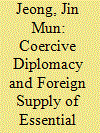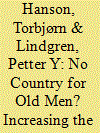|
|
|
Sort Order |
|
|
|
Items / Page
|
|
|
|
|
|
|
| Srl | Item |
| 1 |
ID:
182558


|
|
|
|
|
| Summary/Abstract |
Economic sanctions constrain targets’ capacity to maintain essential goods imports from foreign suppliers. This research points out that target states may respond to this adverse effect of sanctions by redirecting the resources invested to secondary goods imports to essential goods imports. In addition, I suggest that the availability of this strategy significantly varies across sanctions instruments. When facing foreign aid sanctions, targets may be able to effectively reallocate their import funding to sustain foreign supply of essential items. However, when they are subject to trade sanctions, such a response is not readily available. In the data analysis with 150 countries from 1974 to 2006, I utilize foodstuffs as a proxy of essential goods and provide evidence that targets under foreign aid sanctions transfer their import funding to maintain adequate amount of food aid. Yet, I find no evidence that targets subject to trade sanctions also respond with the same manner.
|
|
|
|
|
|
|
|
|
|
|
|
|
|
|
|
| 2 |
ID:
182554


|
|
|
|
|
| Summary/Abstract |
This paper presents new evidence on the effects of neighbors and allies on defense burdens using a spatial econometrics model with panel data on 36 countries in Europe collected over 19 years. Apart from the conventional spatial matrices of geographical neighbors, we develop special political vicinity matrices based on arms transfers, which reveal political closeness among countries, and solve the problems associated with endogenous weight matrices by using a QMLE approach. The regression results demonstrate that the defense burden is positively and spatially correlated among geographical neighbors. The use of political vicinity matrices reveals a negative effect of allied relations on defense burdens, which supports the free-riding theory in alliances for setting a defense budget. With composite matrices, the intimidation effect induced by geographical approaches is dominated by the free-riding actions of allies, and the effect becomes more pronounced over time.
|
|
|
|
|
|
|
|
|
|
|
|
|
|
|
|
| 3 |
ID:
182559


|
|
|
|
|
| Summary/Abstract |
Ageing workforces due to low fertility rates and higher life expectancies challenge modern industrialized economies. In order to secure economic welfare and to balance public budgets, governments worldwide implement reforms to increase the retirement age. The trend towards a higher retirement age confronts defense sectors that for centuries have been in search of an age structure characterized by ‘youth and vigor’. In this article, we study the economic gains to society when the special retirement age for military personnel in the Norwegian Armed Forces is increased. Combining the literatures on pension, personnel, and military economics, we identify mechanisms crucial to the outcome of a special retirement age reform. Monte Carlo simulation is applied to illustrate the potential impact on the economic net gains of uncertain variables. We find that an increase in the retirement age provides substantial net benefits to society, even under fairly negative assumptions about the consequences for retention, motivation and efforts, and the value of elderly personnel in the Norwegian Armed Forces.
|
|
|
|
|
|
|
|
|
|
|
|
|
|
|
|
| 4 |
ID:
182556


|
|
|
|
|
| Summary/Abstract |
The use and exploration of outer space is, according to the Outer Space Treaty (OST), to be carried out for the benefit and interest of all parties. Outer space is critically important to the defence and national security interests of many nations, none more so than the United States. Over time, a significant space junk problem has emerged. There is growing recognition of this problem and reason to believe that it will only get worse if current activities continue. Space junk presents a threat to the national security interests and economic interests of spacefaring nations. Various solutions are being proposed and developed. This paper presents an economic perspective and, in a particular, a behavioural economics perspective, on the space junk and national security problem. As various potential technological solutions emerge, we are interested in the obstacles that may stand in the way of an optimal prioritisation of the alternatives.
|
|
|
|
|
|
|
|
|
|
|
|
|
|
|
|
| 5 |
ID:
182555


|
|
|
|
|
| Summary/Abstract |
We analyze trust in a game with a double agent and two adversarial intelligence organizations. Greater trust by one organization makes the agent more inclined to align against that organization because the intelligence advantage sought by the agent must come at the expense of a trustor. Conversely, trusting less than the rival organization makes the agent more tempted to double-cross the rival. We identify conditions for a sequential equilibrium where one organization mixes between trust and distrust and the profit-seeking double agent mixes her alignment between the two organizations. When the game includes both profit-seeking and organization-loyal types of agents, semi-separating equilibria are possible, depending on the distribution of agent types and the quality of information about agents’ trustworthiness. Pure-strategy trust by both organizations can be sequentially rational only with the existence of loyal types.
|
|
|
|
|
|
|
|
|
|
|
|
|
|
|
|
| 6 |
ID:
182557


|
|
|
|
|
| Summary/Abstract |
I present evidence that U.S. aid for refugees mitigates civil conflict in their origin country. My main result is that a 10 percent increase in U.S. humanitarian aid for refugees reduces conflict deaths in their origin country by 1.5 percent. Presumably, aid for refugees entices civilians to flee from the location of conflict, thus depriving armed groups of resources and targets.
|
|
|
|
|
|
|
|
|
|
|
|
|
|
|
|
|
|
|
|
|